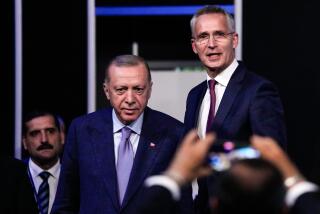Ozal Reverses Turkish Policy, Talks to Kurds
- Share via
ANKARA, Turkey — To the astonishment of foreign observers and officials of his own government, President Turgut Ozal has scrapped the historic underpinnings of Turkish national policy to open contacts with Iraqi Kurds fighting to overthrow Iraqi President Saddam Hussein.
Turkey will send humanitarian aid and is weighing a rebel request to serve as a conduit for arms to Kurdish insurgents, who claim to control large areas of northern Iraq but expect a counterattack by the Iraqi army, senior government officials said Wednesday.
In authorizing talks with the rebels last weekend, diplomats say, Ozal signaled Turkey’s unabashed abandonment of nonintervention in the affairs of its Arab neighbors and dropped a half-century-old refusal to deal with Kurdish political leaders.
Diplomatic sources called his maneuver an attempt to position Turkey, a secular Muslim democracy, for postwar influence in the region, particularly in Iraq’s oil-rich northern areas. Syria and Iran are also competing to influence events, and while all three agree that Iraq’s prewar boundaries must be respected, none trusts the others.
“The Kurds are being manipulated one way or the other. Everyone else is talking to them. Why not us?” Ozal said in announcing the meeting to reporters this week en route to a state visit to Moscow.
Ozal’s political opponents challenge his initiative. Even some of his supporters warn that it could backfire by complicating already strained relations between the government and Turkey’s 12-million-member Kurdish minority.
Last weekend, two senior Turkish Foreign Ministry officials met in Ankara with Jalal Talabani, leader of the Patriotic Union of Kurdistan, and a representative of Masoud Barzani, whose Kurdish Democratic Party insurgents are also fighting the Baghdad government in northern provinces that are home to most of Iraq’s 3.5 million Kurds.
Since then, sources said, there have been regular telephone contacts between the Kurds and officials in Turkey. The Kurds were told that Turkey could not accept the emergence of an independent Kurdish state in what is now northern Iraq but that it would not object to an autonomous Kurdish region in confederation with whatever government replaces Hussein, government sources said.
In government circles, it was understood that Turkey agreed it would send food and medicine to Iraq through international relief agencies and that Iraqi Kurds living in refugee camps in southeastern Turkey would be allowed to return home--unarmed--to join the insurgents.
According to one source, Talabani said the rebels had promises of ample arms from Arab nations but wondered whether Turkey would allow them to pass through its territory en route to Iraq. With Ozal in the Soviet Union until Saturday, there has not been a Turkish response to that request, the sources said.
Prime Minister Yildirim Akbulut was unhappy when he learned of the presidential initiative, government sources said. A spokesman for the major opposition party called it an “inappropriate” break with longstanding policy.
BACKGROUND
As the Ottoman Empire, Turkey controlled what is now Iraq and much of Arab regions in the Middle East. Since the founding of the Turkish republic in 1923, it has been government policy to suppress Kurdish nationalism. In the southeast, an eight-year insurgency by Marxist separatists has claimed more than 2,500 lives. Prime Minister Turgut Ozal recently promised to abolish laws forbidding the use of the Kurdish language and free hundreds of jailed Kurdish nationalists. About half of the 25 million Kurds live in Turkey, with the rest in Iraq, Syria, Iran and the Soviet Union. The Kurds claim they are the world’s largest nation without a state, but their calls for a homeland have never won international support.
More to Read
Sign up for Essential California
The most important California stories and recommendations in your inbox every morning.
You may occasionally receive promotional content from the Los Angeles Times.













